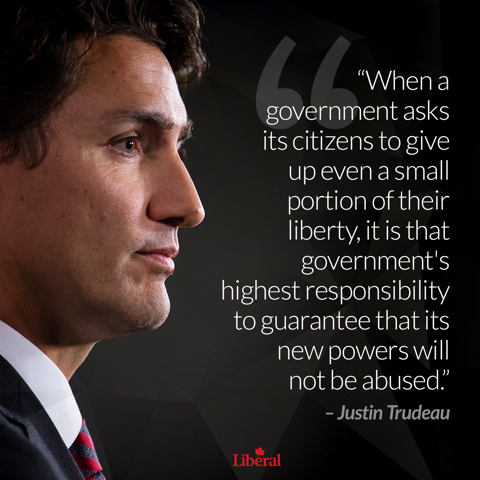It is, in a sense, refreshing to see some of our political leaders openly and honestly admitting that they are taking a specific political position so as to pander to the misgivings or fears of the electorate.
Recently we saw Shawinigan, Que. Mayor Michel Angers acknowledge that he had capitulated to the sentiments and fears of constituents, against his own beliefs, when he and his council rejected issuing a permit for a small mosque in a town industrial park.
Now, on the national level, we find no less than the leader of the Liberal Party, Justin Trudeau, telling a University of British Columbia crowd, while trying to explain why he is not voting against the government’s dangerous Bill C-51:
But we know that, tactically, this government would be perfectly happy if the opposition completely voted against this bill because it fits into their fear narrative and [their desire to]… bash people on security.
I do not want this government making political hay out of an issue… or trying to, out of an issue as important as security for Canadians…
…This conversation might be different if we weren’t months from an election campaign, but we are.
In other words, it seems Trudeau and his caucus are going to vote for a bill they know to be, at the very least, profoundly flawed, in large part explicitly because an election is coming.
It is perhaps admirable, on a certain level, that he is admitting to utterly gutless and terribly cynical political maneuvering — but only if that level is set at the lowest of expectations.
Similar comments at an event in Toronto, at which he also criticized the Tories for engaging in fear-mongering against Canada’s Muslim community, but where he again reaffirmed his willingness to vote for the Tory security bill (“I don’t want to get into a political fight over this,” he admitted) led to a Vice headline, “Trudeau Says Conservatives Are Prejudiced Against Muslims, But Is Still Cool with C-51.”
Trudeau is completely correct that the Tories are seeking to use the politics of fear to get re-elected and that they seem to be willing to stoop to just about any low in this goal.
From totally ludicrous “surveys” being mailed to constituents by Tory MPs, to outrageously incendiary Facebook memes, to facile and simplistic narratives about the Niqab, to the straight-up dog-whistle rhetoric, the Harper Tories are betting heavily that this will get Canadians to overlook falling oil prices, a sluggish economy and an awful record in government.
The problem for Trudeau when he says that he does not want to get into a “political fight” over the bill or let the Tories make “hay” is precisely that this Tory strategy is a political strategy and they are actively trying to make hay out of it.
It is, ultimately, inane for Trudeau to attack all of the premises, bigoted rhetoric and fear-mongering that the Tories are using to sell C-51 but then to commit to voting for it with-or-without amendments.
Doing so accepts fundamentally as a given that Harper is actually politically right about Canadians and admits that their “fear narrative” is a more powerful one than would be a strong and principled stance rejecting a bill that Trudeau knows to be wrong.
It will likely lead many Canadians to ask, if the bill, seemingly by Trudeau’s own admission, is, in fact, necessary enough that the Liberals will vote for it, Harper must be at least partly right that terrorism represents a truly profound threat to the country and about his “us-versus-them” stance.
If Harper is partly right about the need for the bill, then why not, as voters, get fully on board with the “tough-on-terrorism” regime proposing it?
Trudeau may yet find that the totally bankrupt stance that he has taken due to his own fears and cynicism about the Canadian electorate will become prophetically self-fulfilling.



